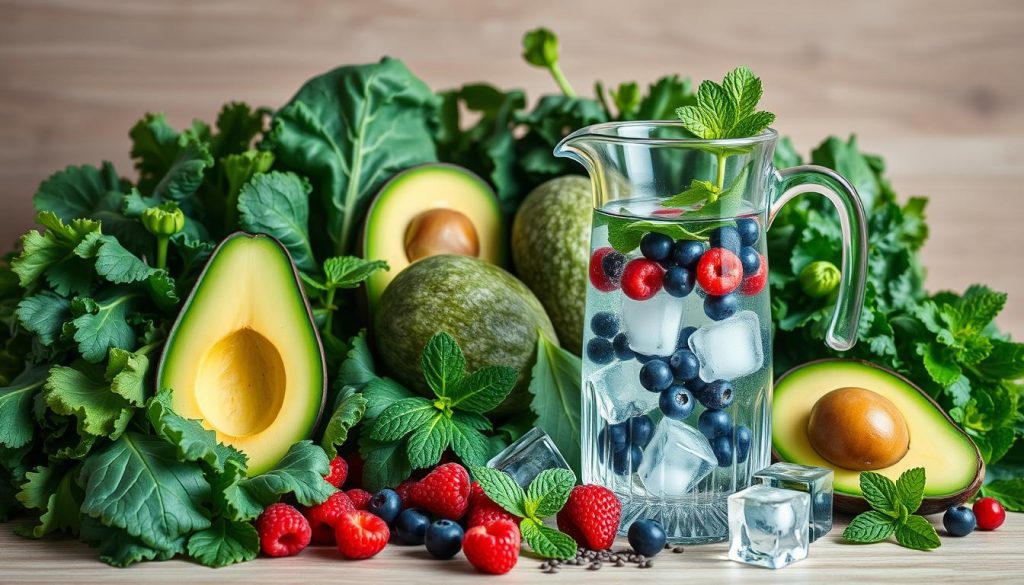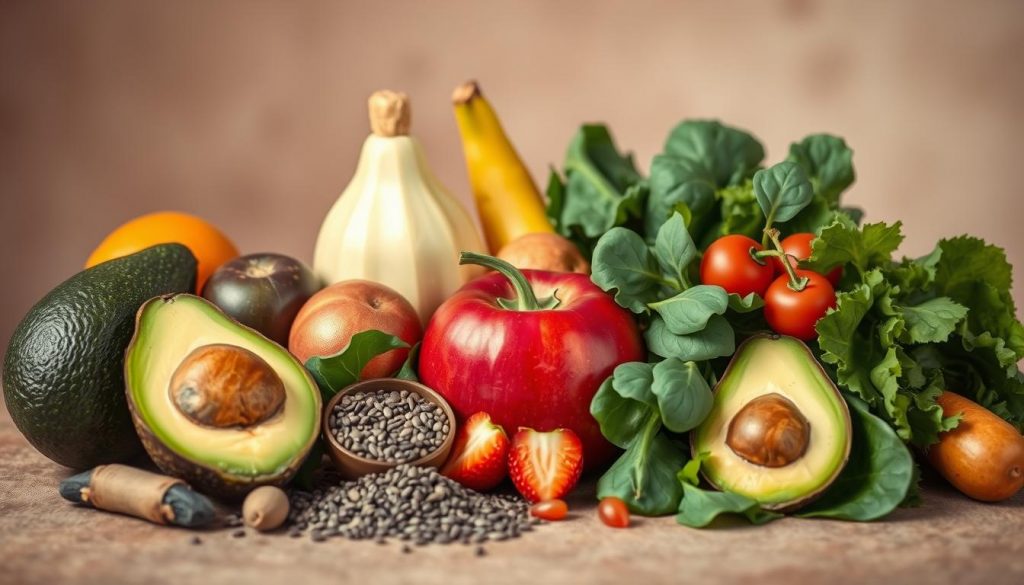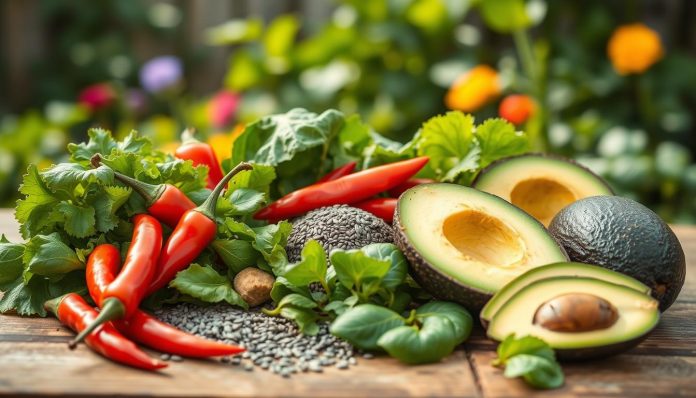Do you often feel hungry and crave food, even when you’re eating healthy? You’re not alone. Many people are looking for natural ways to control their appetite and lose weight. But did you know that vegan appetite suppressants could be the answer you’ve been searching for?
Table of Contents
Key Takeaways
- Vegan appetite suppressants can help you feel fuller for longer, reducing the urge to overeat and promoting sustainable weight loss.
- Natural, plant-based ingredients like fiber, protein, and certain herbs and spices can act as powerful appetite suppressants.
- Incorporating these vegan-friendly appetite-controlling foods and supplements into your diet can boost your energy levels, improve your mood, and support your overall health and well-being.
- Understanding the science behind appetite regulation and mindful eating practices can help you personalize your approach to weight management.
- Debunking common myths about appetite suppressants can help you make informed decisions and achieve your long-term health goals.
In this guide, we’ll explore vegan appetite suppressants in depth. We’ll look at the science behind their effectiveness, their benefits, and the natural ingredients that can help control hunger. Whether you want to lose weight, manage cravings, or improve your health, this guide will give you the tools and knowledge you need to succeed12.
Understanding Appetite Suppressants
Appetite suppressants help reduce hunger and food cravings. They work by affecting hormones and neurotransmitters that control our appetite3. Natural ones often have fiber, protein, or compounds that slow digestion and increase fullness.
What Are Appetite Suppressants?
Appetite suppressants are products that help control hunger and reduce food intake. They can be dietary supplements, herbal remedies, or even foods and drinks. Vegan and plant-based options, like fiber-rich superfoods or green tea extract, are becoming popular as cruelty-free choices3.
How Do They Work?
Appetite suppressants affect the body’s hormonal and neurological systems. They may boost hormones like leptin, which tells the brain you’re full, or lower ghrelin, the “hunger hormone.”4 Some also slow down digestion, making you feel full for longer.
Natural vegan appetite suppressants often rely on fiber-rich foods. Experts suggest eating 25 to 30 grams of protein and 25 to 30 grams of fiber per meal to stay full3.
Understanding how appetite suppressants work helps make smart choices for a plant-based lifestyle. This supports health and wellness goals34.
Benefits of Vegan Appetite Suppressants
Vegan appetite suppressants do more than help with weight. They boost energy by keeping blood sugar stable and provide lasting nutrition5. Even dark chocolate can lift your mood by affecting brain chemicals6. These plant-based foods are packed with vitamins, minerals, and antioxidants, improving your health and happiness.
Weight Management
Vegan appetite suppressants are great for managing weight. Women need about 1,500 calories a day to lose weight, while men need around 2,0005. These natural aids help control hunger and lower calorie intake, aiding in a healthy weight loss.
Improved Energy Levels
Many vegan appetite suppressants, like green tea and protein-rich foods, keep blood sugar steady and give lasting energy56. This means better focus, stamina, and energy, helping you stay active and focused all day.
Enhanced Mood
Some vegan appetite suppressants, like dark chocolate with 70% cocoa, can make you feel happier6. They help control hunger and boost mood, making for a healthier, more balanced life.
“Vegan appetite suppressants offer a holistic approach to weight management, energy levels, and overall well-being.”
Natural Ingredients Known to Suppress Appetite
Looking for ways to manage our appetite ethically? Nature has many answers. Foods like apples, sweet potatoes, and oatmeal are great for this. They’re full of fiber, which slows digestion and makes us feel full7.
Superfoods also play a big role. Ginger and cayenne pepper boost our metabolism and cut hunger. Almonds, with their protein and healthy fats, help us eat less and feel less hungry7.
| Ingredient | Appetite-Suppressing Properties |
|---|---|
| Apples | Contain 52 calories per 100 grams, compared to 536 calories in potato chips, with a lower calorie density that helps promote feelings of fullness7. |
| Sweet Potatoes | A fiber-rich food that can stretch the gastrointestinal tract, leading to the consumption of 156 calories from apples compared to 1,608 calories from potato chips7. |
| Oatmeal | Provides a good source of protein, which can promote weight loss through reduced energy consumption and increased feelings of fullness7. |
| Ginger | Unique bioactives in ginger have been found to help reduce hunger, according to a 2012 study8. |
| Cayenne Pepper | Contains appetite-suppressing compounds that can help manage hunger and cravings7. |
| Almonds | Rich in protein and healthy fats, helping to lower overall hunger and desire for high-fat foods7. |
Adding these natural ingredients to our diet is a smart choice. It’s better for our health and the planet7.
The Role of Fiber in Appetite Control
Fiber is key in controlling our hunger and helping with weight management. Soluble and insoluble fibers work differently to reduce cravings and keep us feeling full.
Soluble vs. Insoluble Fiber
Soluble fiber, found in oats, apples, and berries, turns into a gel in the stomach. This slows digestion and keeps us feeling full longer9. Insoluble fiber, in veggies, whole grains, and nuts, makes food bulkier. This makes us feel full with fewer calories9.
How Much Fiber Do You Need?
Adults should aim for 25 to 30 grams of fiber daily for better appetite control10. But, most people only get about 15 grams a day10. This means they miss out on fiber’s benefits for weight management and health.
Eating more vegan slimming aids and natural appetite control foods like fruits, veggies, whole grains, and legumes can help. These foods are great for reducing cravings and aiding in weight loss.
“Dietary fiber consumption has been linked to a negative correlation with weight gain, with individuals who consume more fiber tend to be slimmer.”9
Knowing how soluble and insoluble fibers affect hunger can help you make better food choices. This way, you can boost your fiber intake and support your health and wellness.
Herbal Supplements for Appetite Suppression
Herbal appetite suppressants are popular among vegans and health enthusiasts. Green tea extract and Garcinia Cambogia are two key ingredients known for their appetite-reducing effects.
Green Tea Extract
Green tea extract boosts metabolism and reduces hunger. It contains caffeine and catechins that help burn calories and fat11. Studies suggest it can also affect hunger hormones, helping you feel full.
Garcinia Cambogia
Garcinia Cambogia comes from a tropical fruit and is known for its appetite-suppressing properties. It may block fat production and reduce fat storage from carbs11. Yet, more research is needed to confirm its long-term safety and effectiveness.
These herbal supplements offer a natural choice for vegans and those looking for plant-based options11. They use natural ingredients to help manage cravings and support health goals.
| Supplement | Key Ingredients | Benefits | Potential Side Effects |
|---|---|---|---|
| Leanbean | Garcinia Cambogia, Green Coffee, Zinc | Energizing workouts, enhanced metabolism, significant weight loss results | None reported |
| PhenQ | Chromium Picolinate, Capsimax Powder | Appetite control, fat reduction | None reported |
| Instant Knockout | Cayenne Pepper, Green Tea Leaf Extract | Fat burning, reduced calorie absorption, less hunger | Headaches, stomach discomfort |
| Powher | Chromium, Magnesium, Iron, Glucomannan | Immune system support, appetite suppression | None reported |
This table shows the effectiveness, ingredients, and side effects of these herbal appetite suppressants. It helps those looking for specific benefits like immune support1112.
“Herbal supplements can offer a natural and potentially effective way to manage appetite and support weight loss goals, but it’s important to consult with a healthcare professional before incorporating them into your routine.”
It’s vital to research any supplement before adding it to your routine. This includes understanding the ingredients, possible interactions, and safety. By doing this, you can make choices that fit your vegan or plant-based lifestyle1112.
The Importance of Hydration
Drinking enough water is key for keeping your appetite in check and staying healthy. Drinking water before meals can help you eat less, by up to 75-90 calories per meal13. It also helps control cravings and keeps your appetite balanced.
Water as a Natural Appetite Suppressant
Water is a powerful tool for controlling hunger. It fills your stomach, making you feel full. This can help you eat less and manage your weight13. Drinking water before meals is a simple habit that can help you reach your weight goals.
Herbal Teas
Herbal teas, like green tea, offer vegan hunger blocking benefits. They contain catechins, which boost metabolism and help control hunger14. Drinking a warm herbal tea can make you feel full and satisfied.
| Herbal Tea | Appetite-Suppressing Benefits |
|---|---|
| Green Tea | Contains catechins that may boost metabolism and suppress appetite14 |
| Ginger Tea | May reduce hunger and increase feelings of fullness14 |
| Peppermint Tea | Has a cooling effect that may help curb cravings and overeating |
Adding these hydrating and appetite-suppressing drinks to your daily routine can help with natural appetite control and weight management.

Incorporating Plant-Based Protein
Plant-based proteins are key in managing weight and feeling full. Foods like tofu, lentils, and quinoa are not just healthy. They also help control hunger and keep us full longer.
Types of Plant-Based Protein
Tofu, made from soy, contains genistein, which helps reduce hunger15. Legumes like lentils and chickpeas are great for protein. They make meals more filling. Quinoa, a complete grain, has all the amino acids we need.
Protein’s Role in Appetite Control
Protein-rich foods keep us from eating too much16. High-protein diets help with weight loss and control blood sugar in diabetes15. Protein preloads also reduce hunger and increase fullness in everyone15.
Proteins from different sources affect hunger and calorie intake differently. Whey protein often has the strongest effect15. Mixing various plant-based proteins in your diet helps control hunger and boosts nutrition.
“Getting enough protein during weight loss can help minimize muscle loss.” – Current Opinion in Clinical Nutrition and Metabolic Care
Plant-based proteins are essential for a strong vegan appetite suppressant plan. A diet rich in these proteins can greatly improve our health and satisfaction1516.
Meal Timing and Frequency
Managing appetite on a vegan diet involves meal timing and frequency. Intermittent fasting can regulate hunger hormones and lower calorie intake. Studies show that eating in a 2-hour window in the evening can lead to more weight loss than eating three meals a day17. Also, eating 1 or 2 meals daily can help reduce BMI yearly compared to eating three times a day17.
Intermittent Fasting on a Vegan Diet
Intermittent fasting can be good for appetite control, but it must be done safely and in line with vegan values. Eating very little, like just one meal a day, can raise bad cholesterol and blood pressure. It’s key to find a balance that suits your body and needs17.
Scheduled Meals for Better Control
Having a regular meal schedule can help control hunger and stop overeating. Eating protein-rich vegan diet pills in the morning can cut down on evening snacks and calories. Research finds that eating one or two meals a day can help manage weight better than three meals a day17. Always talk to a healthcare professional to make sure your ethical appetite management plan is good for your health and wellness goals.
“The timing and frequency of meals can significantly impact appetite control, and finding the right balance is key to achieving your vegan weight management goals.”
Mindful Eating Practices
In today’s fast world, it’s easy to eat without thinking, leading to eating too much. But, by practicing mindful eating, we can control our appetite and choose better foods18.
Techniques to Reduce Overeating
One key way to stop eating too much is to eat slowly and enjoy each bite. This helps our body know when we’re full, so we stop eating when we’re just satisfied19. Also, listening to our hunger and fullness signals helps us avoid using vegan slimming aids. Instead, we trust our body’s natural hunger signals20.
The Benefit of Slow Eating
Slow eating not only cuts down on overeating but also makes meals more enjoyable. By chewing well and enjoying the flavors, we feel more satisfied. This makes us less likely to grab unhealthy snacks later19. It also helps our digestion, as our body has time to digest and use the nutrients from our plant-based meals20.
Mindful eating can greatly help us control our appetite and improve our health. By eating slowly, listening to our body, and enjoying our food, we can have a healthier relationship with food. This way, we can reach our weight goals without needing vegan slimming aids181920.

“Mindful eating is not a diet, it’s a lifestyle. It’s about being present and appreciating the nourishment we receive from our food.”
The Psychological Aspect of Appetite
Understanding why we feel hungry is key to managing our appetite. Cravings and emotional eating often come from deep emotional or habitual reasons, not just hunger21. Research shows that 30% of people eat more when feeling down, while 48% eat less21. This shows how our minds and eating habits are closely linked.
Understanding Cravings
Cravings can be strong and hard to ignore, leading us to unhealthy snacks. These cravings usually come from emotional needs, not hunger21. Studies suggest that eating plants might help control our appetite better than other diets.
Mindfulness and Intuitive Eating
Mindfulness and intuitive eating can help manage our hunger and cravings. By listening to our body’s hunger signals, we can stop emotional eating21. People who eat plants tend to have lower BMIs and less obesity, showing the diet’s benefits.
Stress management, like meditation, can also help control our appetite21. By tackling the emotional and psychological reasons behind our eating, we can have a healthier relationship with food.
“The key to sustainable weight management lies not just in what we eat, but in how we think about and approach our relationship with food.”
Common Misconceptions About Appetite Suppressants
When it comes to vegan hunger blockers and plant-based weight loss supplements, there are several misconceptions. These natural appetite suppressants are not magical solutions. They are tools to support healthy eating habits as part of a balanced lifestyle22.
Myths vs. Facts
One common myth is that natural appetite suppressants can replace proper nutrition. But the truth is, they should be used with a balanced diet and regular exercise for sustainable weight management22. Another misconception is that these supplements are a one-size-fits-all solution. In reality, individual needs and health conditions can vary greatly.
It’s important to understand that while plant-based diets are associated with lower risks of cardiovascular disease and mortality22, they may also pose challenges in meeting certain nutrient requirements, such as protein intake22. Consulting with a healthcare professional before starting any new supplement regimen is advisable, even more so for those with pre-existing health conditions.
Understanding Safe Use
Safe use of vegan hunger blockers and plant-based weight loss supplements involves incorporating them as part of a balanced lifestyle, not as a replacement for proper nutrition22. It’s important to remember that natural does not always equate to safe. Even plant-based foods can have risks if consumed in excess22.
By understanding the myths and facts surrounding these supplements, and by using them responsibly under the guidance of healthcare professionals, individuals can make informed decisions. This supports their weight management goals while prioritizing their overall health and well-being.
Conclusion: Finding the Right Solution for You
Finding the right vegan appetite suppressant is a personal journey. What works for one might not work for another. Our needs and preferences vary greatly. It’s key to try different natural vegan appetite suppressants and techniques to find what works for you. Research shows that about one billion people worldwide are overweight or obese. This highlights the need for ethical appetite management solutions23.
Personalizing Your Approach
There are many vegan appetite suppressants to choose from. Options include fiber-rich superfoods, herbal supplements like green tea extract, and Garcinia Cambogia. You can also consider supplements like Trec Nutrition Appetite Control, Xtendlife’s Garcinia Cambogia and Green Coffee Bean Extract, and Swanson’s Garcinia Cambogia23. It’s vital to listen to your body and choose what fits your lifestyle and health goals.
Maintaining Long-Term Health Goals
Managing weight and health is more than just suppressing appetite. A balanced vegan diet, regular exercise, enough sleep, and stress management are key. Experts say to talk to healthcare professionals before using supplements. This is because their safety and effectiveness are not fully known, despite their popularity23. By adopting a holistic lifestyle, we can reach our health goals and have a healthy relationship with food and our bodies.
FAQ
What are natural appetite suppressant foods?
How do appetite suppressants work?
What are the benefits of vegan appetite suppressants?
What are some natural ingredients known to suppress appetite?
What is the role of fiber in appetite control?
What are some herbal supplements for appetite suppression?
How can hydration help with appetite control?
What role do plant-based proteins play in appetite control?
How can meal timing and frequency impact appetite control?
What are some mindful eating practices for appetite control?
How does the psychological aspect of appetite affect appetite control?
What are some misconceptions about appetite suppressants?
Source Links
- 10 Best Appetite Suppressant Pills for Appetite Control & Hunger Cravings – International Society of Nephrology (ISN)
- A Guide to Natural Appetite Suppressants
- If You’re Constantly Hungry, These Foods And Drinks Will Help Curb Your Appetite Naturally
- Berberine for Appetite Suppressant and Prevention of Obesity
- Vegan Diet for Weight Loss: Does It Work?
- Move Aside Ozempic: 25 Foods That Act As Natural Appetite Suppressants
- 25 Drinks and Foods That Suppress Appetite and Cravings | NOVI Health
- 15 Foods That Are Nature’s Appetite Suppressants
- Protein‐enriched fiber vegan meal promote satiety and suppress food intake in rats
- The Incredible BULK! Curb Appetite, Boost Health with a High Fiber Plant-Based Diet
- Top 7 Natural Appetite Suppressant Supplements to Control Hunger
- A Guide to Natural Appetite Suppressants
- Nutritional Update for Physicians: Plant-Based Diets
- Natural Appetite Suppressants? How to Control Your Hunger Naturally — Healthy For Life Meals | Fresh & Healthy Meal Plan Delivery
- Frontiers | Impacts of dietary animal and plant protein on weight and glycemic control in health, obesity and type 2 diabetes: friend or foe?
- Are Protein Shakes Good for Weight Loss? Here’s What a Dietitian Says
- One Meal a Day Diet: Benefits, Risks, and More
- Satisfying the Vegan Hunger: A Guide to Staying Full and Fulfilled
- Natural GLP-1 Activation for Appetite Suppression
- 9 Simple Ways That Will Make You Feel Empowered Over Your Appetite
- Depression, Anxiety, Emotional Eating, and Body Mass Index among Self-Reported Vegetarians and Non-Vegetarians: A Cross-Sectional Study in Peruvian Adults
- 6 Biggest Myths About Plant-Based Diets
- 13 Best Appetite Suppressants That Actually Work – Welzo












